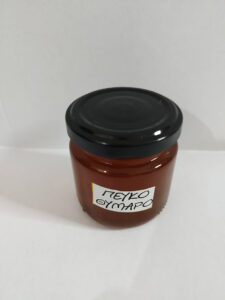Thyme honey is rich in carbohydrates , contains more than 25% pollen grains.
It is particularly rich in minerals and trace elements such as calcium, magnesium, boron, silicon, iron, zinc and manganese. It also contains the flavonoids quercetin, hesperidin, catechin, camphor, naringin, etc., in quantities that vary according to geographical origin.

Scientific studies have shown that it possesses strong antimicrobial, antiseptic and antifungal activity, effectively inhibiting the viability of a wide range of resistant microbes and pathogenic fungi such as S. aureus, S. Epidermidis, E. coli, C. albigans, etc. It also possesses anti-estrogenic activity at low concentration and chemoprotective activity against breast, prostate and endometrial cancer.
Greek organic pine honey has the strongest antibacterial properties among all tested honeys. They were found to exert antibacterial activity against E coli, S. marcescens, B sphaericus, S. epidermidis, and B subtilis.
It has antiseptic action, helps in the treatment of inflammation and acts against cough and gout. It is also a wonderful remedy for throat diseases and thanks to its low Ph and high hydrogen peroxide content, it effectively treats a wide range of pathogenic microorganisms, thus contributing significantly to the prevention and treatment of many diseases.
In addition, pine honey has a strong anti-estrogenic effect on breast cancer cells, is a tonic, increases the heart rate, reduces ulcer problems and, due to its high choline content, helps people suffering from constipation. It has strong antimicrobial properties.
In addition to trace elements, pine honey is rich in carbohydrates (fructose, dextrose, sucrose), organic acids, proteins, amino acids, mineral salts, enzymes, vitamins, sodium and potassium and has fewer calories than other honeys.






Reviews
There are no reviews yet.